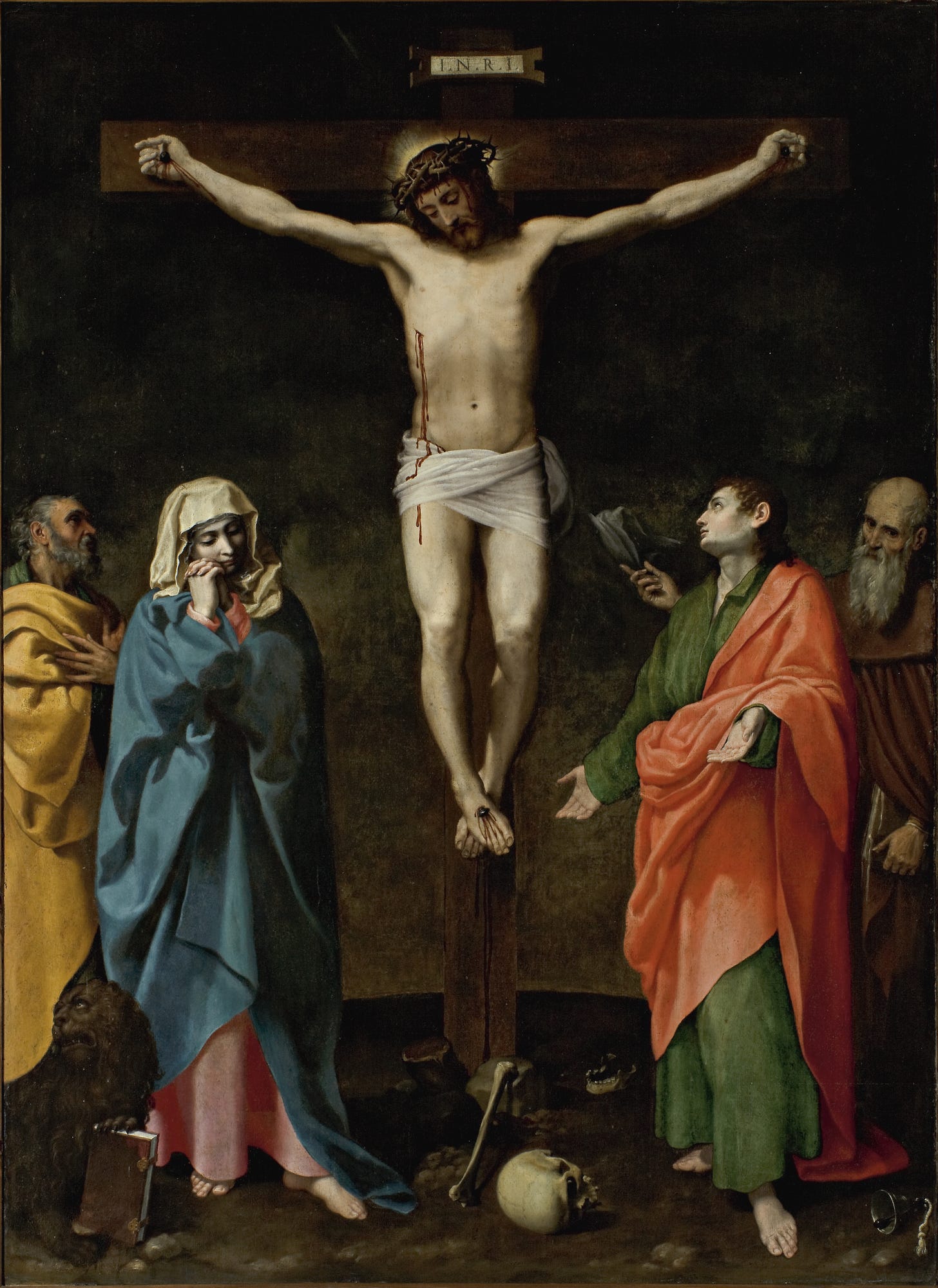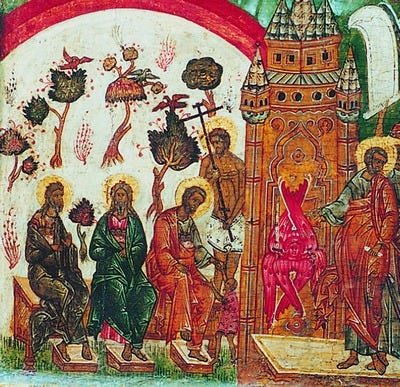St. Dismas, Soldier of the Cross
Gospel Reflection for Palm Sunday, April 13, 2025
(For readings, see usccb.org)
Today is Palm Sunday, the first day of Holy Week which will culminate in the Holy Triduum and Easter, the holiest day of the year, when Our Lord, thought dead and buried, conquered sin and death forever through His Resurrection. This week, we will relive the events that led to Easter – Spy Wednesday, when Judas betrayed Him; Maundy Thursday, when He instituted the Holy Sacrifice of the Mass at the Last Supper; and Good Friday, when His ‘hour’ was completed and He offered Himself as the true Eucharist on the Cross, consummating God’s love story with mankind which began with Adam and entailed many millennia of sorrow only to be reversed in the ultimate eucatastrophe of Easter.
For this Palm Sunday, I would like to focus on someone who is a relatively minor character in the story, taking only a marginal role, yet who bears profound significance for us today. This character is St. Dismas, so named by a later patristic document, the ‘good thief’ who was crucified with Our Lord, defended Him against the provocations of the other criminal and asked to be remembered when He should come into His Kingdom.
There are many traditions surrounding St. Dismas, as well as important correlative details for his words and compassion with Christ. Perhaps most importantly, it can be said that he is a clear representative of what Pope St. John Paul II called “historical man,” that is, man under original sin as he has lived since Adam and Eve’s expulsion from Eden, cursed by his rejection of God with death, illness, concupiscence and disordered relationships with nature, each other and God. St. Dismas is an ordinary man; although a criminal, he likely lived a normal life, probably as a Jew since Roman citizens were not usually crucified, and faced a fate which was not strange to those under Roman rule, whether they deserved it or not. But, unlike the self-professed servants of the Law, the Pharisees and Sadducees, St. Dismas humbly admitted his guilt, accepted his just sentence of capital punishment and begged for Christ’s mercy.
In this way, St. Dismas offers us a true example of sainthood. Even if we are Catholics in good standing, believing all that is held in Tradition and alive with sanctifying grace, we are not immaculate like the Virgin Mary; instead, like St. Dismas, we are afflicted with the consequences of original sin, even if Baptism has erased its stain from us, and we must struggle daily with our myriad temptations, demonic attacks, persecutions from others and the effects of our own wrongdoing.
Palm Sunday offers a poignant and discomforting reminder of our historical condition. Every time we sin, we share in Christ’s Passion: our hatred flogs His skin, our indifference spits in His face, our mockery crowns Him with thorns, our lusts of the flesh hammer the nails into His hands, our greed wounds His feet and our lack of faith in the Gospel stabs a spear into His very Sacred Heart. So, when we cry out, “Crucify Him! Crucify Him!” these are not empty words but a verbal expression and remembrance of our sinfulness.
St. Dismas, with Christ, is crucified on Golgotha, the ‘place of the skull.’ The Fathers understood this name in reference to Adam, who is believed to have been buried there, and so in iconography a skull is often placed at Our Lord’s feet to symbolize this. It also represents Christ’s fulfillment of the Protoevangelium from Genesis 3:15, with His feet, through their very frailty and worldly powerlessness, crushing the head of Satan and defeating his spiritual dominion over the earth. By His apparent loss, He prevails over all adversity, and thus does the Kingdom He establishes take on a unique, otherworldly character: ruled by service, powerful through mercy, led by the wounded Lamb and the immaculate Virgin, called and sanctified by grace rather than any preexisting merit, taught by revelation, saved by the very weapons of sin which Satan wields against it, namely suffering and death. The Kingdom of God is truly not of this world.
Finally, Our Lord’s response to St. Dismas invites a common question: what did He mean by “today you will be with me in Paradise”? Does this mean the Sacraments of the Church aren’t really necessary for salvation, even ordinarily, as Protestants will often object? How can St. Dismas have gone to Heaven “this day” when Christ’s Ascension into Heaven didn’t occur until many days after?
These are important questions which, with the help of Tradition, offer many intriguing insights. According to St. Thomas Aquinas, St. Dismas, as a Jew, had a share in Christ’s baptismal grace by anticipation, through the Old Law sacrament of circumcision, which was a type of Baptism and looked forward to its fulfillment by Christ, thus granting justification to the righteous of Israel.
The holy people of God in history, who longed for the coming of the Messiah, were some of those whom Christ led into Heaven at His Ascension. But this didn’t occur on the ‘day’ of the Crucifixion. So, what did His words to St. Dismas mean? St. Thomas Aquinas says that, when Christ died, He descended to ‘hell,’ as we say in the Creed. However, traditionally, ‘hell’ was understood to include many levels, as in Dante’s Divine Comedy, essentially any afterlife state below Heaven. St. Thomas said that when Christ went to Hell (where, contrary to Luther, Calvin, and Hans Urs von Balthasar, He was not damned), He gave the Beatific Vision to the holy souls there in the Hell of the dead, i.e. Abraham’s bosom as it’s called in Christ’s parable, (Lk 16:22) thus transforming it temporarily into the Paradise referred to by St. Dismas and which he experienced that day. Christ then remained there before returning to Earth on Easter and didn’t lead St. Dismas and the other righteous souls to Heaven until He went there Himself in the Ascension. Indeed, according to St. Thomas, the brilliance of divine glory shone by Christ into the Hell of the dead was so powerful that the demons and the souls of the damned in the lower Hell could feel it and recoil in pain.
As this reflection shows, St. Dismas is a fascinating character, despite his brief appearance in the Gospel narrative. He is a son of Adam in his fallenness, an archetype for ourselves as historical men, a saint of deep humility, contrition and faith, and one of the last pre-Christian saints who went with Christ into the Hell of the dead where the just lived in Abraham’s bosom awaiting the Messiah. Finally, he became one of the soldiers in Christ’s great army of the Church Triumphant when He marched into Heaven at the Ascension.
This Palm Sunday, let us pray for the intercession of St. Dismas, that we may imitate his honesty, patience, penitence and total confidence in God, as Lent draws to a close. Like Scrooge, may we learn to carry our Lenten promises in our hearts throughout the year, growing in virtue from our sacrifices and being inspired by the hope of Easter to renounce worldliness and live for the Kingdom of God.
It seemed certain that at the moment when the Kingdom of the heaven would come to touch the earth, it would immediately burst the fragile envelop of time, dissipate sorrow, cast out death, renew all things, and transfigure the universe. Indeed, should it descend for anything other than this? But, behold, on the contrary, that its power is covered with signs of weakness and its grandeur with signs of humility. Behold that its eternity slips silently under the unchanged bark of time. Behold that its felicity is immersed in the very ocean of our trials. It was made so as to disperse suffering, temptations, and death, and behold that it chooses to live in the midst of them so as to tame them, seeking not—alas!—to eliminate them but only to illuminate them. The law of its radiation ought to be a law of the glorious transfiguration and behold that it wishes to be first of all and for long centuries only a law of sorrowful sanctification. We expected it in its radiance of the heavenly kingdom, and behold that it has come to us with the traits of a pilgrim and crucified kingdom.
(Charles Journet)
Join the Fellowship at Saint Tolkien!




So nice to reflect on the importance of this rarely mentioned Saint! Thank you and have a blessed holy week!
Very beautiful! Blessed Easter! ✝️✝️